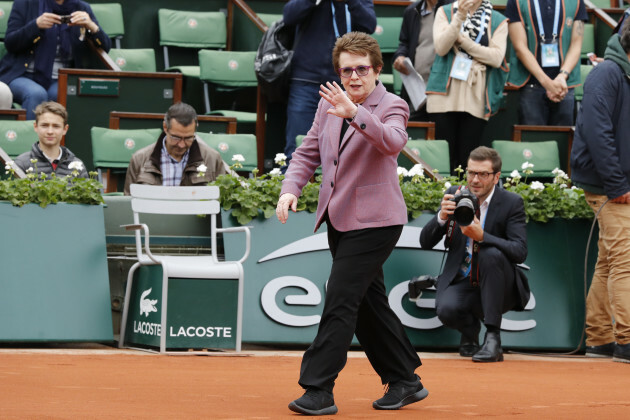CURRENTLY 700TH IN the ATP World Rankings, Egyptian tennis player Issam Haitham Taweel had his relative obscurity blown by John McEnroe this week.
“Well, if she played the men’s circuit, she’d be, like, 700 in the world,” said McEnroe, leading many to Google who Serena Williams would apparently be battling with were she to take on a new Battle of the Sexes.
Looking at Issam’s record, most reckoned Serena would be up to 699 in jig-time.
Of course the notion of Issam Haitham Taweel or any other male tennis player going toe-to-toe with the 23-time Grand Slam singles champion is as ridiculous as any exercise that pits two athletes from different disciplines against each other (yes, Messrs McGregor and Mayweather, I’m looking at you).
Boxing enthusiasts would never speculate about how, say, middleweight champion Gennady Golovkin would fare against heavyweight king Anthony Joshua; instead they talk about ‘pound-for-pound’ comparisons, an evaluation which, in Serena’s case, would surely have seen McEnroe place her among the all-time greats.
Strangely, for the sport in which women enjoy the greatest profile and earning power, this is just the latest example of tennis putting its misogynistic foot into its yammering mouth.
Take Raymond Moore, the chief executive of the Indian Wells tournament who resigned last year after saying women players should “get on [their] knees” in thanks to the male stars who were the sport’s real breadwinners. Novak Djokovic then championed the gender pay gap by claiming the men should be paid more because they draw more spectators.
Then there are the countless incidents of creepy weirdness, like the skin-crawling moment at the 2015 Australian Open when Eugenie Bouchard was asked by the on-court interviewer to “give us a twirl”; or the schoolboy-level references to ‘hormones’ as heard in Jo-Wilfred Tsonga’s explanation for the topsy-turvy nature of women’s rankings: “You know, the girls, they are more unstable emotionally than us…”.
Not to mention the frequent body-shaming endured by Serena.
Perhaps tennis is guilty, as a sport, of something called ‘moral licensing’. In his podcast series ‘Revisionist History’, Malcolm Gladwell defines this idea in simple terms: “When we do something good, sometimes we then give ourselves permission to do something bad.”
When Wimbledon became the last Grand Slam to offer equal prize money in 2007 it was viewed as a major milestone for gender equality in sport. Instead it has ‘licensed’ many to question whether women deserve what they fought so hard for since Bille Jean King formed the WTA in 1973. This attitude views them as ‘kept women’ who should – as Moore’s comment suggested – be damn grateful for what they have been given.
Of course, most of this stuff is little more than unvarnished chauvinism dressed up in tennis whites. The box office appeal of men’s tennis owes more to a transient golden generation than any innate superiority, as memories of the eras of Evert and Navratilova, Graf and Seles prove.
But it’s by addressing another area of regular resentment – that women get the same prize money for playing shorter matches – that a blow could really be struck. While championship tennis is not a clock-punching occupation, until men and women play under the same conditions at Grand Slam tournaments – best-of-five sets – then the prejudiced will always find cause for disdain.
It’s undeniable that women’s Slam matches are denied the epic sweep that five sets provides. Six of the last seven Wimbledon women’s finals have been won in straight sets; in 2014 Petra Kvitova defeated Bouchard in just 55 minutes, while a day later Roger Federer and Novak Djokovic battled it out for almost four hours. Hence the men are portrayed as gladiators and the women as workshy.
Having women confined to best-of-three not only limits the scope to display their talents, to showcase the dramatic comebacks and shifts in momentum the longer format permits, but is in itself a symbol of their secondary status that even financial parity cannot overcome.
It hints at Victorian mores about the weaker sex which should have gone out when Wimbledon champions stopped wearing corsets. Women run marathons and ultra-triathlons: they can manage five sets.
And women want to play five: King has campaigned on the matter for decades, while numerous key figures are on record on the subject. “Our players have always said that they are willing to play three of five sets,” former WTA CEO Stacey Allaster said in 2011. “The Grand Slams decide the format at their events and to date each Grand Slam has opted for the women to play two of three sets.”
“We women are strong, ready, willing and able,” Serena said in 2014. “All the women players have agreed to it, but it’s not what [the Grand Slam tournaments] want at this time.”
It is claimed that the objection is to do with scheduling; that TV timetables could not cope with more long matches at already tightly-packed Grand Slam tournaments. So it is the women who must shuffle aside, accepting inferior status – even while accompanied by an equal paycheque – and the sideways sneers of the patriarchy.
For some at Wimbledon next week, the roof on centre court will not be the only glass ceiling.
*By the way, Issam Haithan Taweel lost to Oleg Khotkov in the last 16 of the ITF Futures tournament in Sharm El Sheikh this week. Khotkov is ranked 854th in the world. Tough week.


